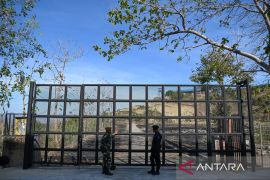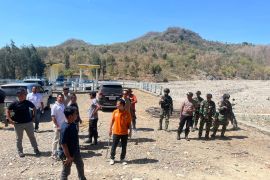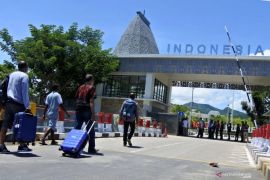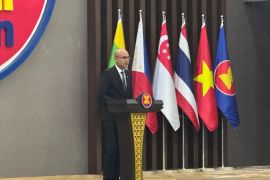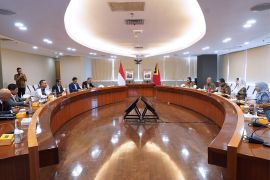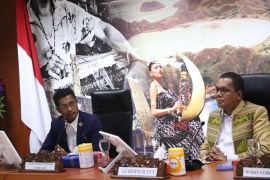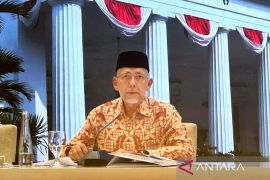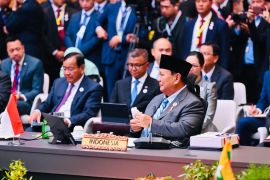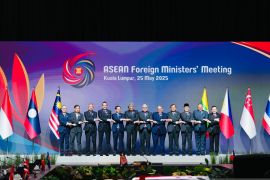The country located in the eastern half of the Timor Island integrated with Indonesia in 1975 through the Balibo Declaration after having remained a Portuguese colony for more than three centuries.
Following 23 years of integration, the vast majority of Timor Leste people voted for seceding from Indonesia through a referendum held on August 30, 1999, and finally gained independence on May 20, 2002.
However, Indonesia has played a pivotal role in bringing progress to the people of Timor Leste, even after it becoms an independent state for more than 11 years.
In reality, Timor Leste remains economically dependent on Indonesia as a source of foodstuff.
"The economic dependence of Timor Leste on Indonesia is high because all our foodstuffs are bought from Indonesia," Timor Leste Home Affairs Minister Jorge da Conceicao Teme stated in Oecusse last Saturday.
Teme pointed it out that it was therefore necessary to maintain security and political stability in Indonesia, so that the countries food delivery could be guaranteed safe passage.
He also expressed his hope that Indonesia would continue to remain stable and peaceful because if there was political instability in Indonesia, it would prevent the distribution of foodstuffs to Timor Leste.
"We really hope that Indonesia will remain peaceful because 90 percent of the basic necessities of the people of Timor Leste are fulfilled by Indonesia," he noted.
During an international conference in Dili on investment in Timor Leste in March, the country`s Transportation and Communications Minister Pedro Lay da Silva had also admitted that Indonesian businessmen and investors were playing an important role in bringing progress to the country.
"It is undeniable that many Indonesian state firms are now investing in Timor Leste for the progress of the country, which gained independence only on May 20, 2002," Da Silva had said at the conference.
The conference had brought together participants from eight countries, with Indonesian firms, such as state airport operator PT Angkasa Pura and surveyor company PT Sucofindo, taking part.
The two Indonesian companies have signed a cooperation agreement with the Dili-based Kabiran Group to develop an international airport in Dili and a seaport in Tibar some 10 kilometers west of the Timor Leste capital.
Till date, 54 Indonesian corporate bodies have become involved in development projects located in Timor Leste. They include eight state-owned companies, namely PT Merpati Nusantara, PT Bank Mandiri, PT Wijaya Karya, PT Perusahaan Perumahan, PT Telkom Internasional, PT Pertamina, PT Angkasa Pura and PT Sucofindo.
Describing Indonesia as a close neighbor and older brother, da Silva stated that the country, particularly its businessmen and investors were badly needed by Timor Leste to develop its economy.
Therefore, he expressed the hope that cordial relations with Indonesia, particularly with the people of West Timor, would continue.
Despite an ongoing border dispute between the two countries, Timor Leste Home Affairs Minister Teme said such issues should not hamper friendly relations between the people.
"The border dispute is the business of Dili and Jakarta. Therefore, the people of East Timor and West Timor can continue with reciprocal visits because we are brothers and sisters as fellow Timorese," the minister noted.
Teme added that he was disappointed with a district head in East Nusa Tenggara, who had forbidden his people from visiting their brothers and sisters in the Timor Leste enclave of Oecusse because of the border dispute at Naktuka and other locations in Oecusse.
The Timor Leste minister, who is an alumnus of the Salatiga Satya Wacana University in Central Java, said efforts to resolve the border dispute between the two countries should continue.
He reiterated that the border issue was the business of Dili and Jakarta, and said there was no reason for any official to forbid his or her people from visiting Timor Leste.
At a bilateral meeting held between President Yudhoyono and his Timor Leste counterpart Taur Matan Ruak, during the latter`s state visit to Indonesia, the two countries had reached an agreement on border demarcation at Dilumil Memo.
The two countries have resolved one of three border demarcation points under the agreement. The other two demarcation points are Bijael Sunan and Noel Besi, located between the Kupang and Timor Tengah Utara districts in Indonesia`s East Nusa Tenggara province, which borders the Oecusse district in Timor Leste.
The two countries also signed a joint statement allowing the opening of the Haekesak/Turiskain-Tunubibi, Builalo-Memo and the Haumeniana-Passabe entry points, as part of the deal.
According to Wilhelmus Wetan Songa of the Nusa Cendana University in Kupang, East Nusa Tenggara, senior officials of the two countries had held meetings numerous times in the past but failed to reach an agreement on border demarcation.
"As a result, border violations have continued," he said, adding that the land border between Indonesia and Timor Leste in the western part of East Nusa Tenggara was 268.8 kilometers long covering the districts of Kupang, Timor Tengah Utara and Belu.
"The total land border in the districts of Kupang, Timor Tengah Utara and Belu, which is 268.8 kilometers long might expand or contract after there has been a follow up to the agreement," Songa pointed out.
He added that the total land border between Timor Leste and Indonesia falling in Timor districts was 149.9 kilometers long, stretching from Motaain in the north to Mota Masin in the south.
Songa further said that the agreement reached by Indonesia and Timor Leste on the border demarcation between the two countries could serve as a step forward step in relations between the two countries, which they should soon follow up on.
"The follow up action is important to give legal certainty and convenience to the people of the two nations living near the border demarcation. It will also prevent a horizontal conflict that might arise at any time, which may disrupt bilateral relations," he noted.
(O001/INE)
EDITED BY INE
(O001/KR-BSR/F001)
Reporter: Otniel Tamindael
Editor: Jafar M Sidik
Copyright © ANTARA 2013

